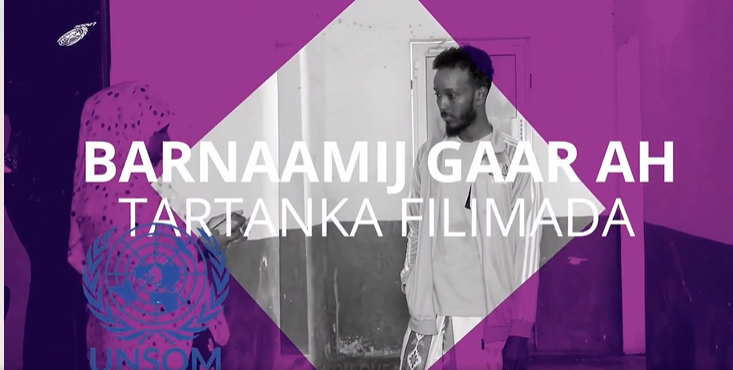In the dynamic landscape of Somali films, where storytelling serves as a powerful medium of expression, the Ministry of Information, Culture, and Tourism, in collaboration with UNSOM, through SNTV, embarked on a groundbreaking documentary. This documentary aimed to shed light on human rights issues in Somalia through a short films developed by talented filmmakers.
The competition yielded remarkable works that not only captivated audiences but also delved deep into critical societal issues. One such standout film, “Kiin,” directed by Ahmed Aweis Hassan, eloquently articulates the essence of human dignity. Through interviews and poignant narratives, Hassan’s film, featuring the protagonist Kiin, resonates with viewers on a profound level. Kiin’s journey serves as a mirror reflecting the intrinsic value of every individual, irrespective of circumstances.
In a similar vein, the second prize-winning film, “Qab iyo Iil,” directed by Abdisamad Biriye, skillfully tackles the complex issue of tribalism and its ramifications on the younger generation and business development. Biriye’s insightful portrayal offers a poignant commentary on the societal fabric of Somalia, highlighting the need for unity and transcending divisive boundaries for progress and prosperity.
“Rajo ayaan leeyahay” or “Still I Have Hope,” the third prize-winning film directed by Salman Sharif Aqil Arts, weaves a tapestry of optimism and resilience through artistic creativity. Aqil Arts’ vision transcends conventional storytelling, offering a narrative that resonates with hope and the enduring spirit of the Somali people.
In the Docunmentary, Ahmed Aweis Hassan, the director of “Kiin,” shared his perspective on the impact of his film: “Human dignity is not a privilege but a fundamental right that should be upheld and respected by all. Through Kiin’s story, I aim to ignite conversations on the importance of recognizing the humanity in each of us.”
Similarly, Abdisamad Biriye, the creative force behind “Qab iyo Iil,” emphasized the importance of addressing tribalism: “Tribal divisions have long plagued our society, hindering progress and stifling unity. It is imperative that we confront this issue head-on to pave the way for a more harmonious and prosperous future.”
Salman Sharif Aqil Arts, the visionary behind “Rajo ayaan leeyahay,” expressed his artistic vision: “Hope is a powerful force that propels us forward even in the face of adversity. Through art, I strive to inspire resilience and optimism, fostering a sense of collective empowerment.”
The documentary explores that films stand as testaments to the transformative power of storytelling and cinema in advocating for human rights and social change in the Somali context. As these narratives continue to resonate with audiences, they serve as catalysts for dialogue, reflection, and ultimately, progress towards a more inclusive and equitable society.
Please Watch here the full Documentary: https://www.facebook.com/share/v/zheHScpLHeZWFKYA/?mibextid=an1DBN
